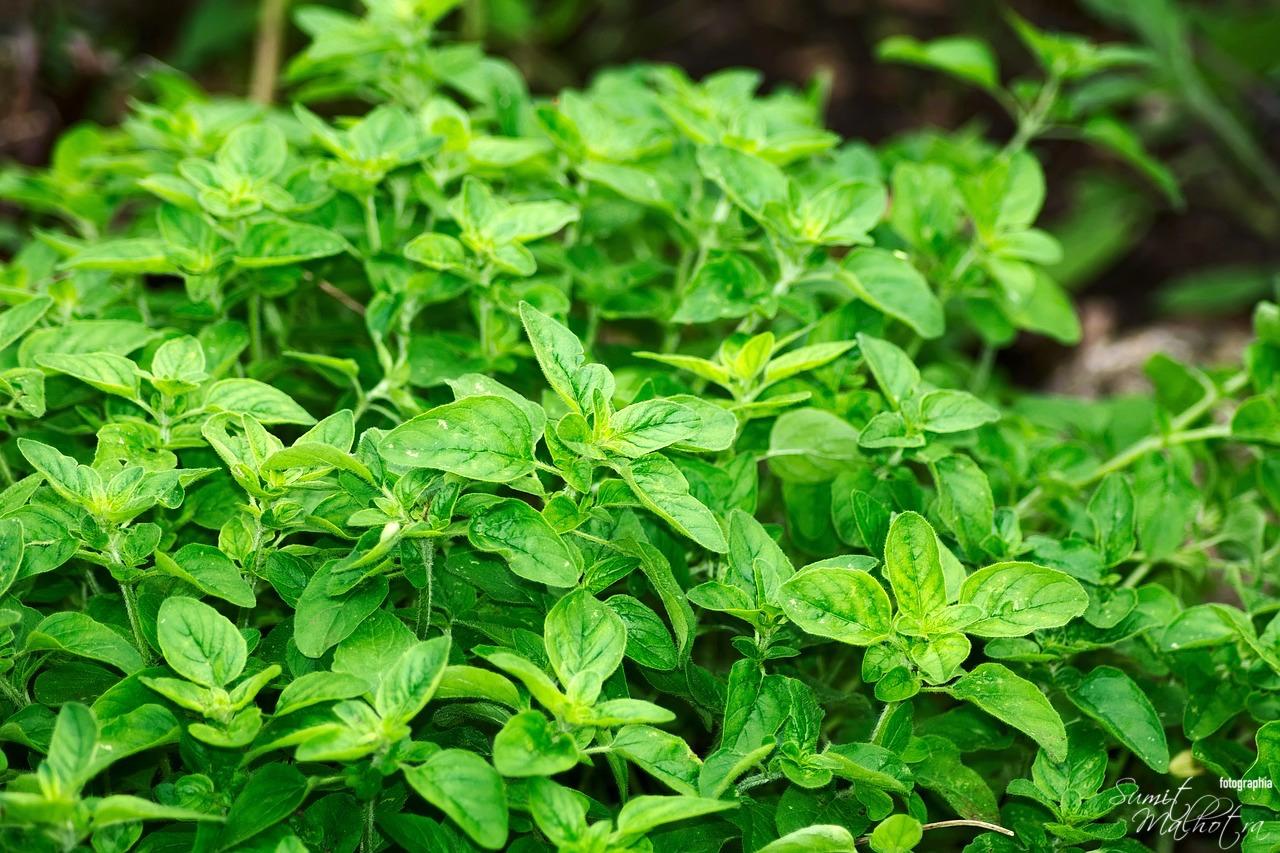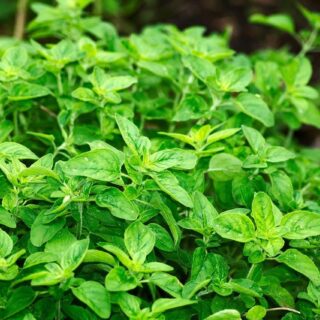All About Oregano | Know Your Spice Ajwain Ki Patti or Sathra (Origanum vulgare)
Oregano, also called Origanum or Wild Marjoram, is a perennial herb with creeping roots, 30-90 cm high, branched woody stems and opposite, petiolate and hairy leaves (1.5 cm long).
Its flowers are pale purple and the flowering period extends from late June to August. Each flower produces four small structures.
The foliage is dotted with small glands containing the volatile oil, which gives the plant its aroma and colour.
Several species of genus Origanum are native to the Mediterranean, all of which are traded as a spice.
Oregano is said to have a ‘balsamic’ flavour; a combination of mint (a closely related herb), thyme, and rosemary. The taste is strong and somewhat bitter.
What are the other names of Oregano?
| Indian Languages | Other Languages | |
| Hindi: Ajwain Ki Patti, Sathra, Mirzanjosh Bengali: Joan Gujarati: Ajamo Malayalam: Kattumaruva Marathi: Owyachi paane Punjabi: Mirzanjosha Sanskrit: Maruvaka Tamil: Karpuravalli Telugu: Mridumaruvamu |
Latin (Botanical): Origanum vulgare Arabic: Anrar, Satar barri Chinese: Ngou Lahk Gong, Ngauh Ji Dutch: Wilde Marjolein French: Marjolaine bâtarde, Origan German: Oregano, Wilder Majoran Italian: Erba acciuga, Origano Spanish: Orégano Swedish: Oregano, Vild Mejram, Kungsmynta |
What exactly is Oregano?

Spice card – all about oregano | know spice card – your spice sathra or ajwain ki patti (origanum vulgare)
Oregano is the common name for a perennial herbaceous plant, Origanum vulgare of the Lamiaceae (Mint family), characterized by opposite, aromatic leaves & purple flowers.
Apart from Oregano, many of the familiar culinary herbs are from this family: mint, basil, marjoram and sage.
Originating in the mountains of Greece, this aromatic herb has long been a hallmark of cooking across the Mediterranean region.
With a name derived from the Greek for “joy of the mountain”, oregano is one of the world’s more well-known and useful plants.
What is the nutritional value of Oregano?
Oregano is rich in polyphenolic flavonoid antioxidants (vitamin A, carotenes, lutein, zeaxanthin, and cryptoxanthin) and has been rated as one of the plant sources with highest antioxidant activities.
It is an excellent source of minerals like potassium, calcium, manganese, iron, and magnesium.
It is very low in cholesterol and sodium. It is also a good source of Vitamin B6, copper. It is rich in dietary fiber, Vitamin C, Vitamin E (Alpha Tocopherol), Vitamin K & folate.
What is the chemical composition of Oregano?
Some populations of oregano can be classified into thymol-‘pure’, carvacrol-‘pure’ and thymol/carvacrol mixed.
Oregano essential oil mainly composed of oxygenated monoterpenes and monoterpene hydrocarbon. The major constituent of the oregano essential oil is carvacrol (41%).
Carvacrol is known to possess strong antioxidant properties and also exhibit antibacterial activity against several bacteria.
The predominant components of the oregano oil are sabinene and β-pinene, β-(Z)-and β-(E)-ocimene, φ-terpinene, E-caryophyllene and germacrene D.
What is the history of Oregano?
Oregano was popular in ancient Egypt, Greece, and Rome as a flavoring for vegetables, wines, meats, and fish. According to Greek mythology, the goddess Aphrodite created oregano as a symbol of happiness.
The Greeks employed oregano in marriage ceremonies to provide joy and in funeral services to provide peace to the departed.
The Greek physician Hippocrates (460-370 BC) used oregano for antiseptic purposes and to protect against respiratory ailments and gastrointestinal distress.
Medieval Europeans would chew on oregano leaves to alleviate rheumatism, toothache, indigestion, and cough.
During this time, Oregano also made the journey to China. It was also used for medicinal purposes in this region. The Chinese people believed it helped with fever, vomiting and upset stomach.
During the Elizabethan era, oregano was used for just about anything. It was used to encourage good luck and good health.
It was used in spells for happiness, tranquility, luck, health, protection and letting go of a loved one. It was also worn during sleeping to give one psychic dreams.
Oregano was not widely used in the United States until after the Second World War. Soldiers discovered the herb during the Italian Campaign and brought it back to the US.
What are the different types of Oregano?
- Greek Oregano (Origanum vulgare)– True oregano, excellent flavour, hardy.
- Syrian Oregano (Oregano maru) – Strong, spicy flavour.
- Turkestan Oregano (Oregano tyttanthum) – Strong flavour, robust plant, good for indoor culture.
- Hopley’s Purple Oregano (Origanum laevigatum) – Purple-green foliage, compact, mild flavor.
- Mexican Oregano (Lippia graveolens) – Good oregano flavour used for chili and Mexican dishes.
What are the uses of Oregano?
- As a culinary spice, oregano’s strong, pungent flavor and aroma has added to the human enjoyment of many foods
- It has strong antiviral and antibacterial properties and is used in traditional medicine.
- Oregano is considered an indispensable ingredient for Greek cuisine.
- Oregano is high in antioxidant activity, due to a high content of phenolic acids and flavonoids.
- Oregano leaves are a good source of iron, manganese, vitamin A and omega-3 fatty acids. Therefore, it is a general immune booster.
- Unsweetened Oregano tea is used as mouthwash, while chewing few leaves of Oregano thrice a day, can help in relief from menstrual cramps.
What does Oregano taste like?
The fresh oregano leaves are peppery and assertive—sometimes even bitter or astringent. It is a pungent herb with bitter, grassy flavors and a trace of mint.
Used correctly, oregano will not overpower your food, but rather complement and enhance the flavours within any dish.
What are the ayurvedic properties of Oregano?
Rasa (Taste): Tikta (Bitter), Kashaya (Astringent)
Guna (Qualities): Teekshna (Strong), Laghu (Light for digestion), Ruksha (Dry)
Veerya (Potency): Ushna (Hot)
Vipaka (Taste conversion after digestion): Katu (Undergoes pungent taste after digestion)
Karma (Actions): Pacifies Kapha and Vata dosha
What can I use Oregano for?
- Use it for tomato sauces, grilled chicken, and fried vegetables.
- For your Greek or any other salad.
- Make a lemon-olive oil sauce that accompanies many fish or meat barbecues and some casseroles.
- Use it to pickle olives, capers, and lovage leaves.
- Use it for flavouring feta, mozzarella type of cheese and your doner kebabs.
- Add some oregano to your pizza dough.
- It is hard to imagine pasta sauce or pizza without it.
- Enhance the taste of your salad dressings, seafood sauces, soups, and poultry.
- Make a Chimichurri or an Oregano Pesto.
- Elevate the taste of your soups.
- Mix it with salt, pepper, and paprika and use as a condiment.
- Use it for flavoring meat – particularly mutton and lamb dishes.
How long does Oregano last?
Fresh oregano lasts about five to seven days, while dry oregano leaves last about two to three years.
How do I store Oregano?
Store it in a plastic bag in the refrigerator for up to three days. If you place a slightly damp paper towel in the bag with the oregano and leave some air in the bag, it may extend the life up to one week.
Store the dried oregano in an airtight container for maximum freshness. It should last for 2-3 years.
Is there a substitute for Oregano?
- Use equal parts of fresh or dried basil for fresh or dried oregano.
- Fresh thyme and oregano not only look similar, they also have a similar flavour when fresh.
- Use Italian seasoning you have saved up from pizza deliveries.
- Marjoram has a similar flavour to oregano. They belong to the same family.
Where do I buy Oregano from?
The herb can be found fresh or in dried and powdered form from local markets and specialty grocers, and in dried form through supermarkets and online retailers.
If buying online try amazon here.
What are the health benefits of Oregano?
The following are health benefits of Oregano Spice (Origanum vulgare) or Ajwain Ki Patti (Sathra)
- Health Benefits of Oregano as an Antioxidant – Antioxidants are naturally occurring compounds that help protect cells against damage caused by unstable molecules known as free radicals.
- Health Benefits of Ajwain Ki Patti (Sathra) for Heart Health – Oregano is the natural form of omega-3 fatty acids that improves heart health. These acids balances the cholesterol levels and reduce inflammation in the cardiovascular system that prevents heart attacks, heart strokes, and atherosclerosis.
- Health Benefits of Ajwain Ki Patti (Sathra) as an Anti-inflammatory Agent – Oregano is filled with vitamins, minerals, and antioxidants that includes essential compounds that are known for anti-inflammatory abilities.
- Health Benefits of Oregano as an Antimicrobial Agent – Extracts and oils from the Ajwain Ki Patti (Sathra) plant show moderate antimicrobial, antifungal, and antiviral properties.
- Health Benefits of Origanum vulgare for Digestion – Oregano essential oil is a heating carminative oil that aids in increasing the pitta flow and promotes quicker digestion.
- Health Benefits of Oregano against Cancer – The University of Arizona research and the study by the Long Island University have proved that Oregano essential oil has antioxidant and anti-cancerous properties that fights against many types of human cancers.
- Health Benefits of Origanum vulgare for Bone Health – Iron, manganese, and calcium are the most important minerals for maintaining the bone health and oregano has a significant amount of all these minerals which makes it great for those people who want to protect themselves against osteoporosis in later stages of life.
- Health Benefits of Oreganoas an Immunity Booster – Oregano leaves are a good source of iron, manganese, vitamin A and omega-3 fatty acids. Therefore, it is a general immune booster.
- Health Benefits of Oregano for Respiration – As Oregano essential oil has warming effect, it can assist the body when it is cold and treat problems like cold, sinusitis, headache, mucous congestion, whooping cough, pneumonia and other respiratory infections.
Oregano - Oregano Tea | Distinctly Flavoured Oregano Tea
Ingredients
- 2 Piece Fresh oregano sprigs or
- 2 Teaspoons Dried Oregano
- Boiling water
Instructions
- Wash the oregano thoroughly.
- Bring the water to a boil.
- Place the oregano sprigs in a mug, and pour over the boiling water.
- Allow the herbs to steep for 5 minutes.
- Strain out the oregano and enjoy.
Notes
- You can add some honey to the tea to make it sweeter if you wish.
- Traditionally, people have used oregano tea to soothe a variety of health issues like sore throat, cough, nausea, digestive problems.
Tools & Equipment Used For This Recipe
FInally! To Sum It Up

Spice card – all about oregano | know spice card – your spice sathra or ajwain ki patti (origanum vulgare)
Oregano, also called Origanum or Wild Marjoram, is a perennial herb with creeping roots, 30-90 cm high, branched woody stems and opposite, petiolate and hairy leaves (1.5 cm long).
Its flowers are pale purple and the flowering period extends from late June to August. Each flower produces four small structures.
The foliage is dotted with small glands containing the volatile oil, which gives the plant its aroma and colour.
Several species of genus Origanum are native to the Mediterranean, all of which are traded as a spice.
Oregano is said to have a ‘balsamic’ flavour; a combination of mint (a closely related herb), thyme, and rosemary. The taste is strong and somewhat bitter.
STAY CONNECTED
If you like this article, you can let us know in the comments below or on social media using #gosumitup and tag @gosumitup.
I am always happy to read your feedback and if you liked the dish or if you made the dish. :)
Better still, take a picture and post it on Instagram and tag it as #gosumitup
Connect direct – You can also connect with me directly on my Instagram and Facebook or on Pinterest.
And, keep visiting us for more of such awesomeness. Do bookmark gosumitup.com into your web browser now or simply subscribe to our browser notifications.
This article has been compiled for general information only and should not be used for the diagnosis or treatment of any medical condition/s.
This information is not intended to diagnose, treat, cure, or prevent any disease.
GoSumItUp.com has used all reasonable care in compiling the information but offers no warranty as to its accuracy or its use in any possible form.
Consult a doctor or other health care professional for diagnosis and treatment of any medical condition/s. For more details please refer to our disclosure policy.





1 comment
Keep working ,great job!